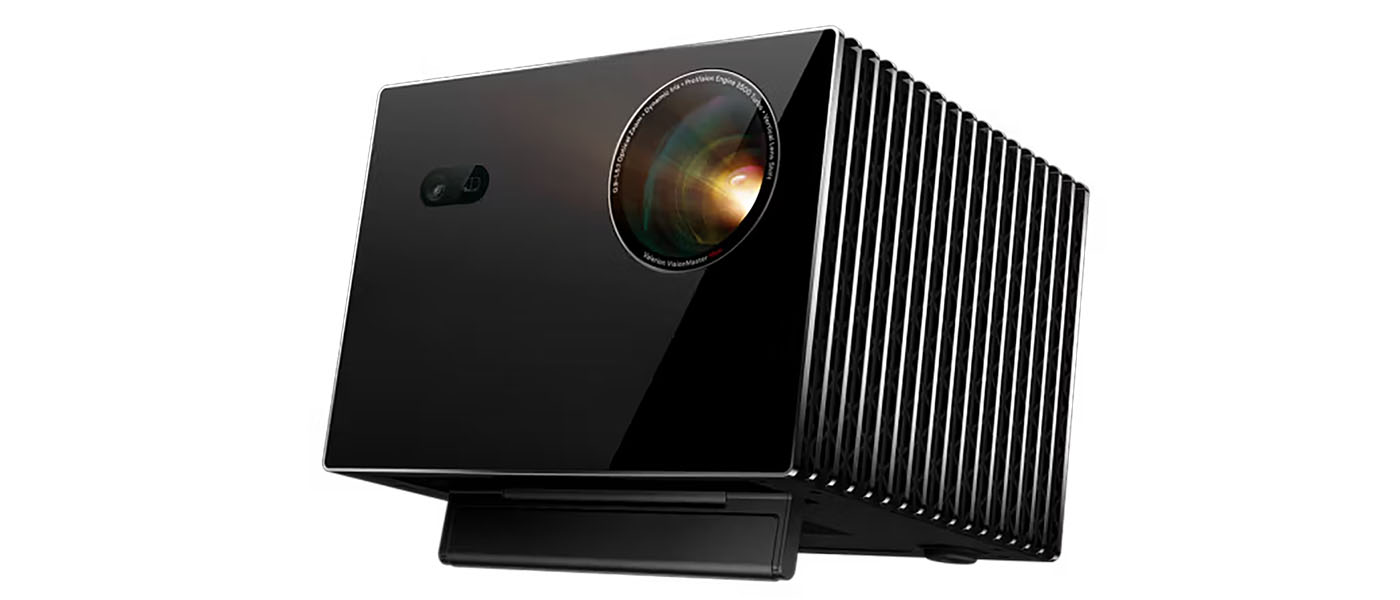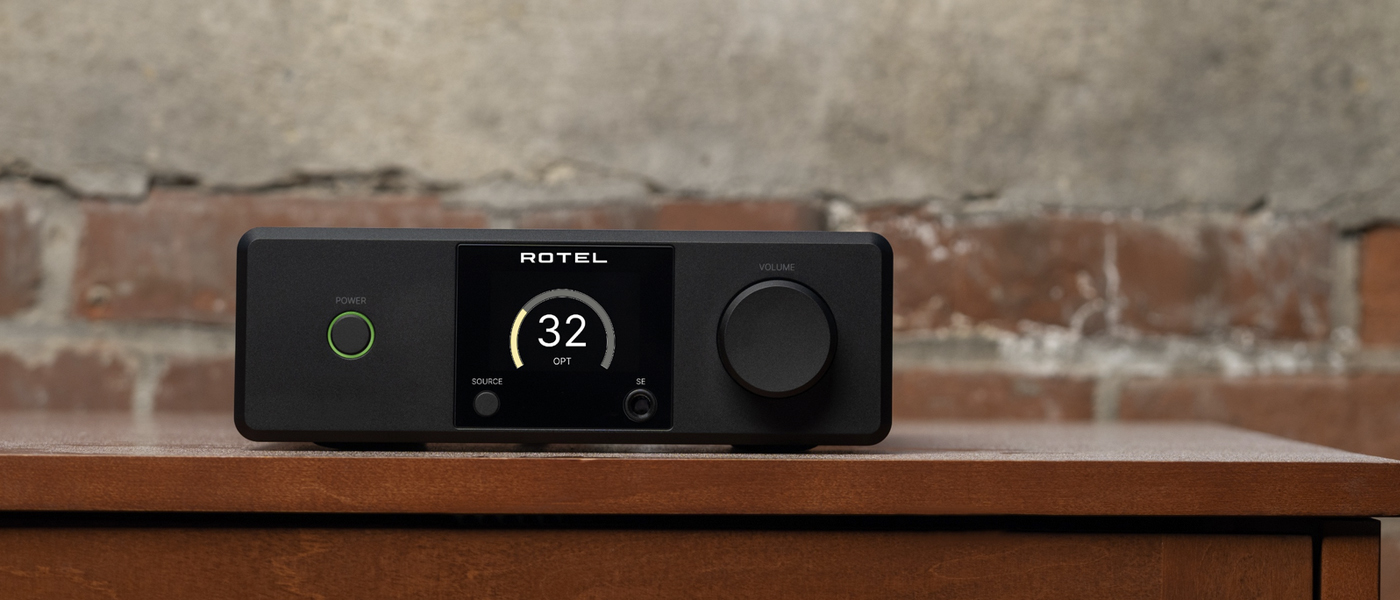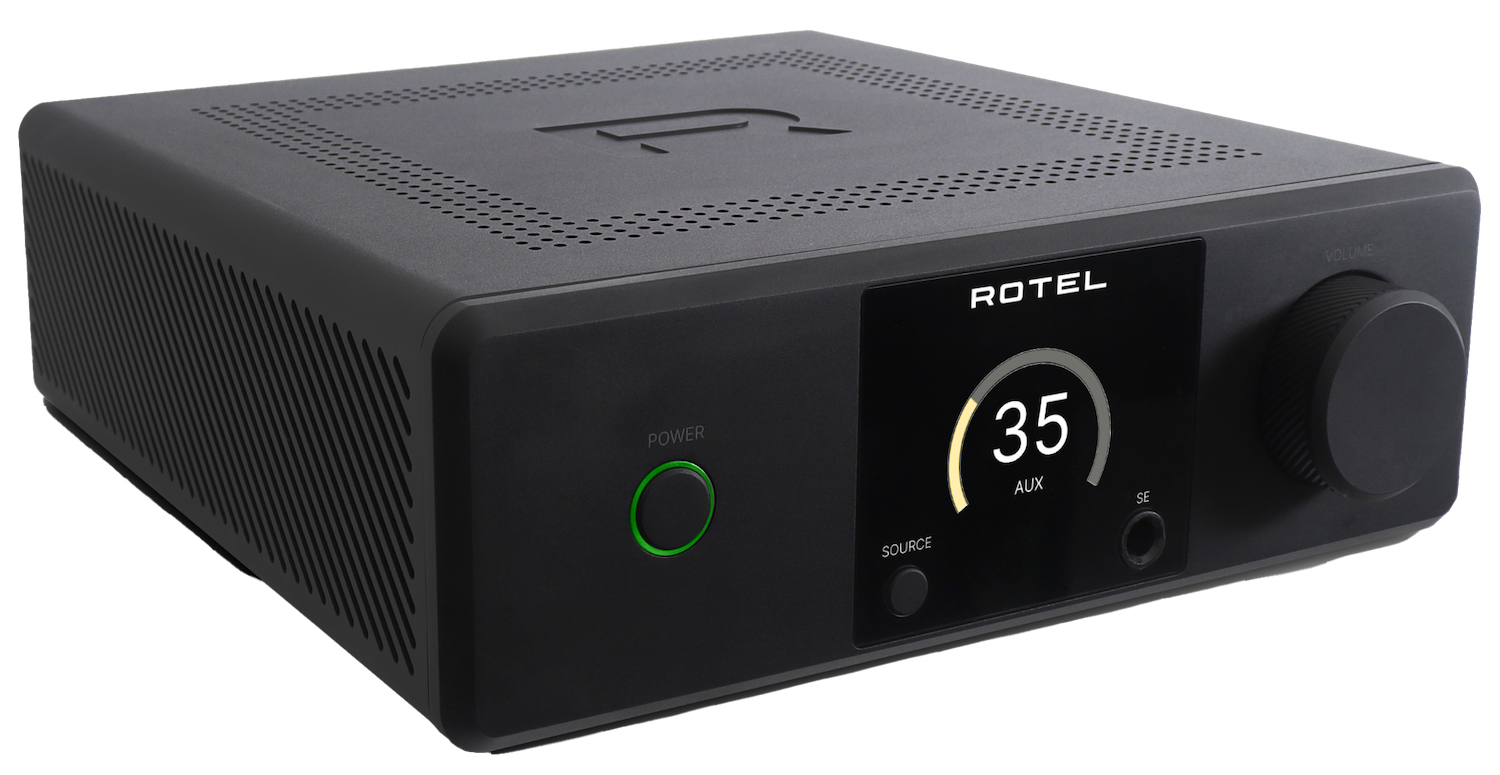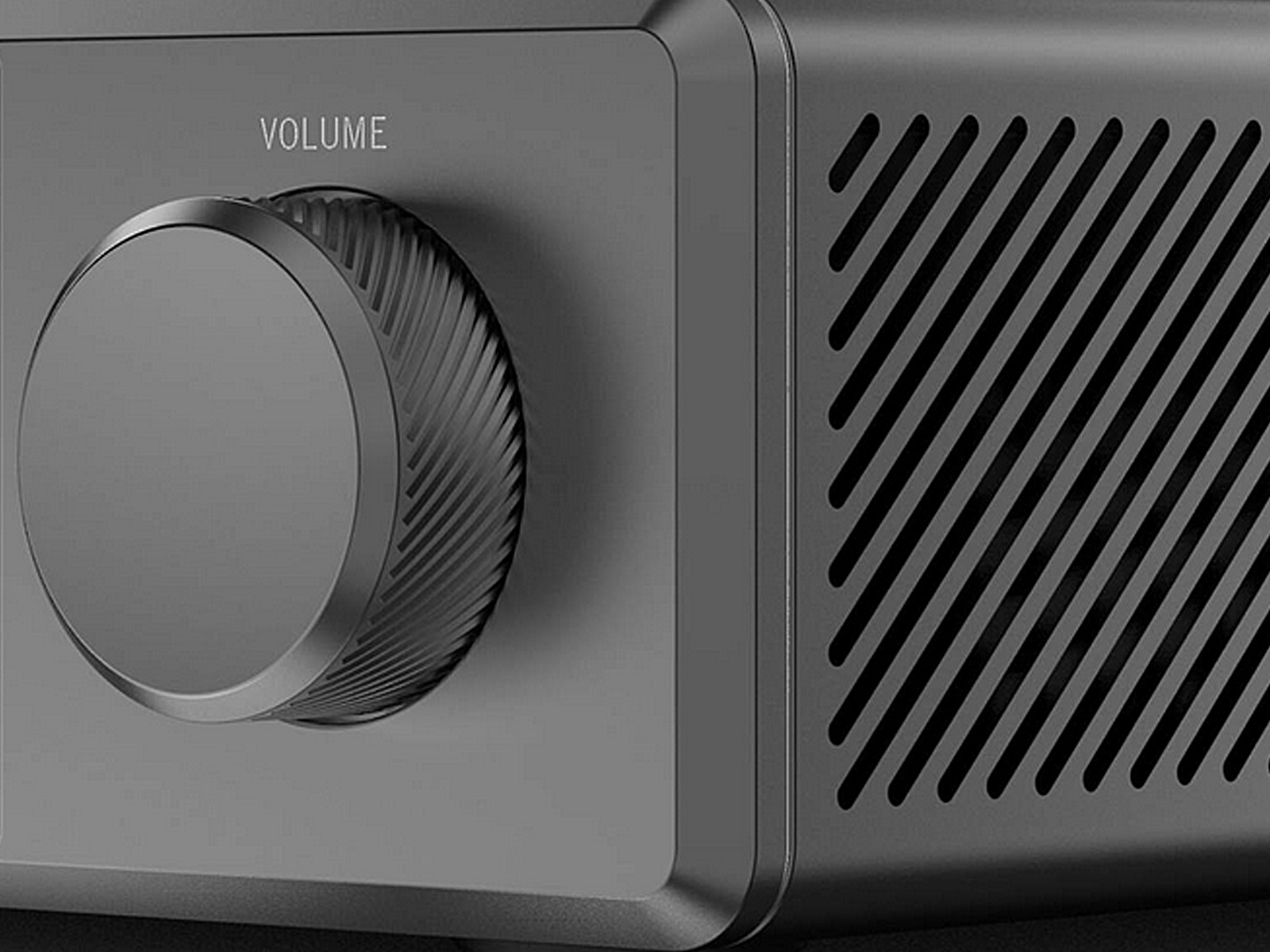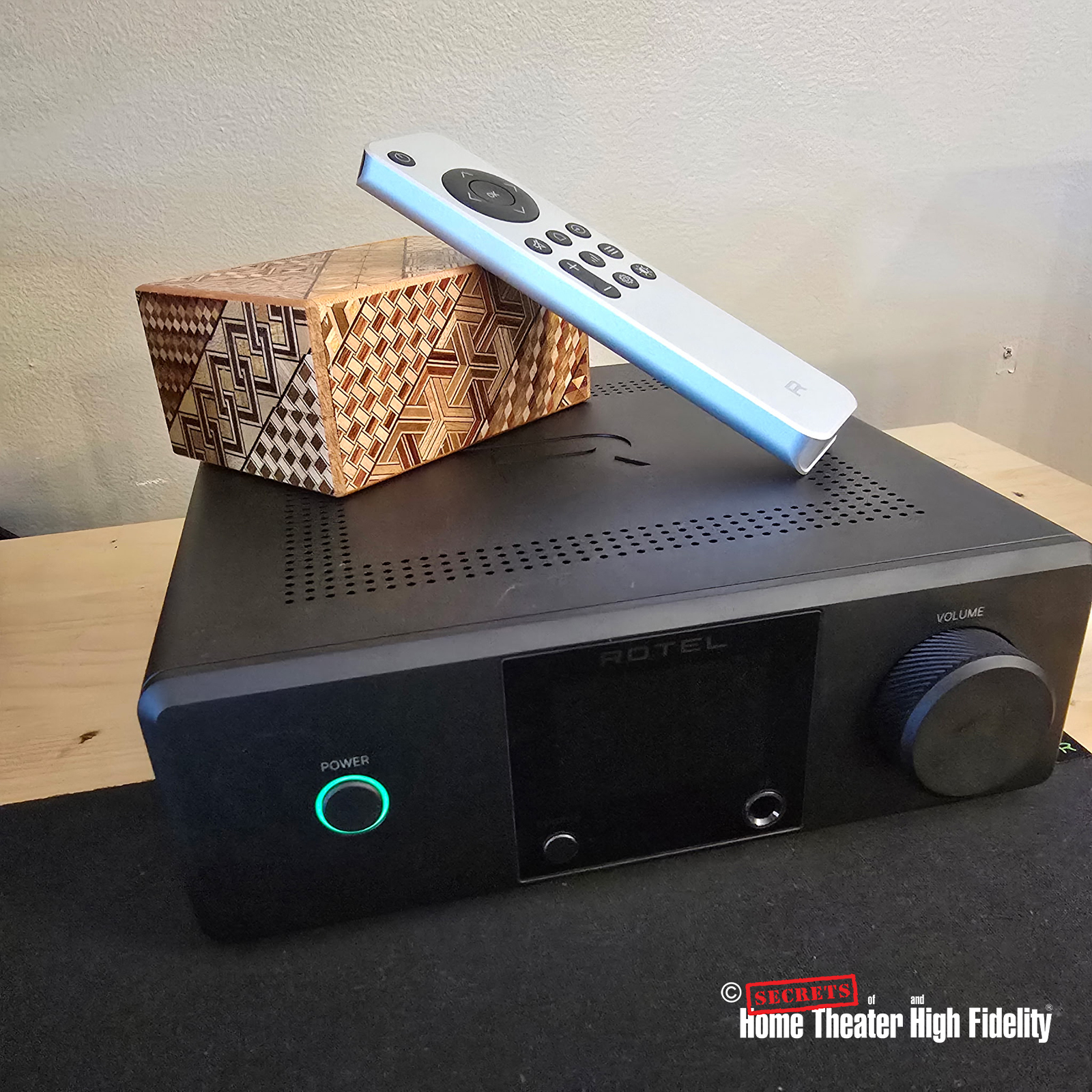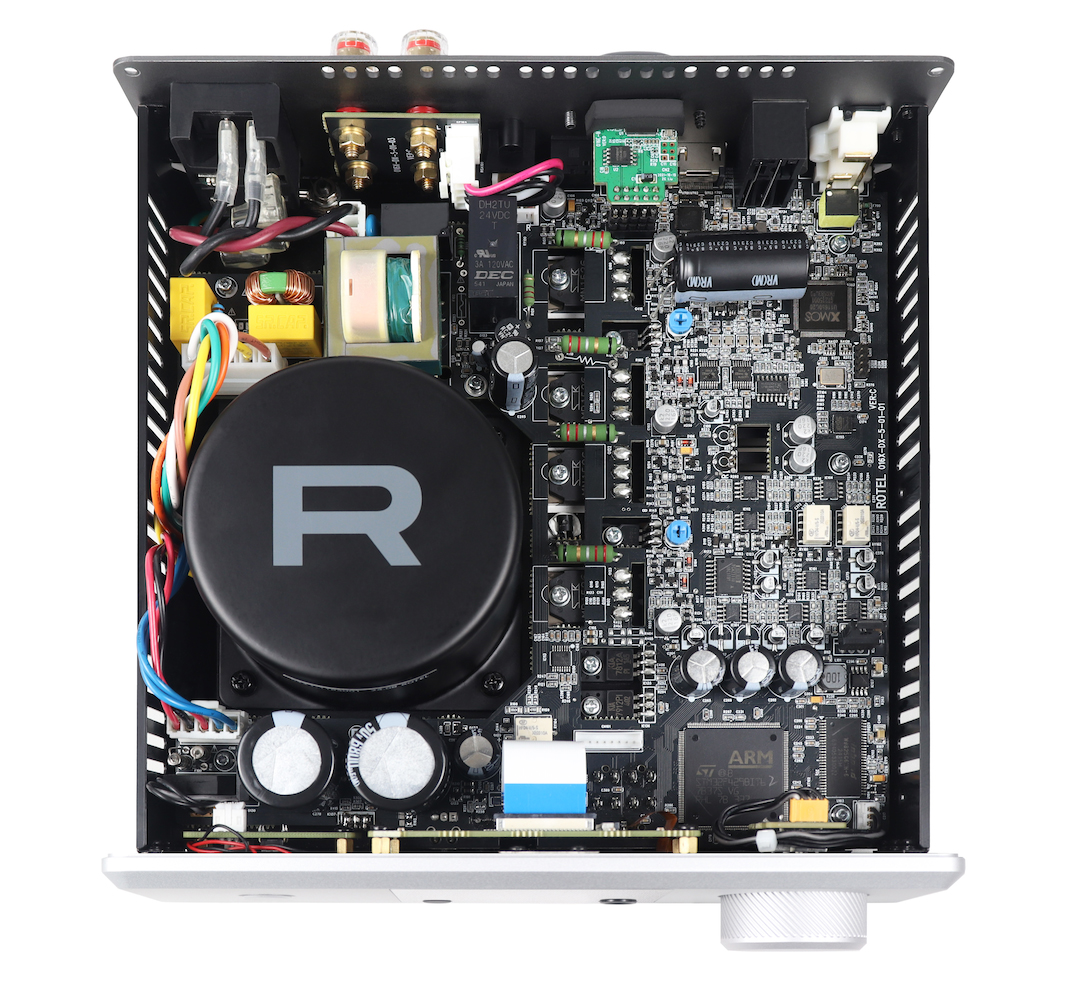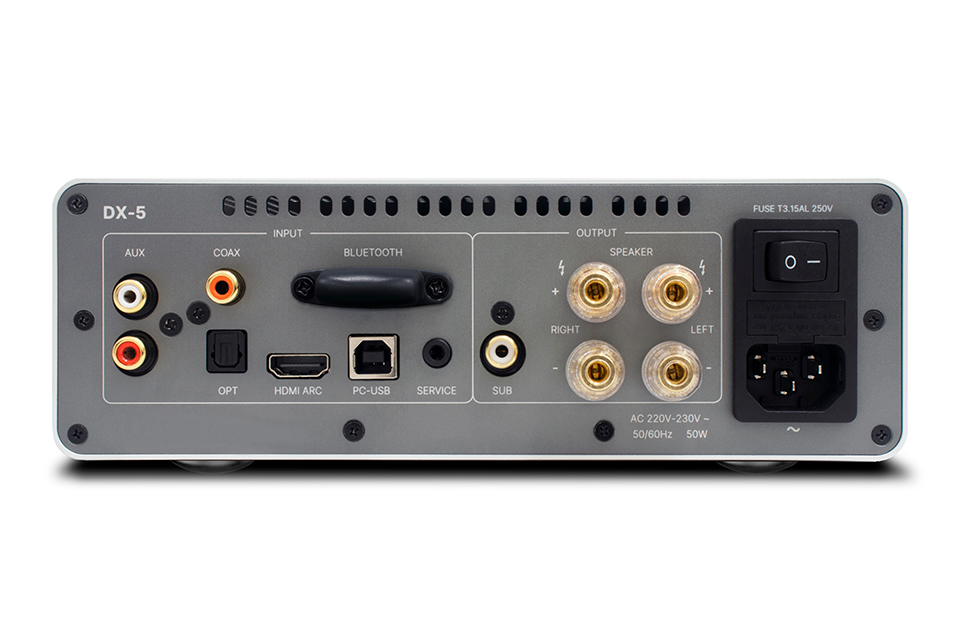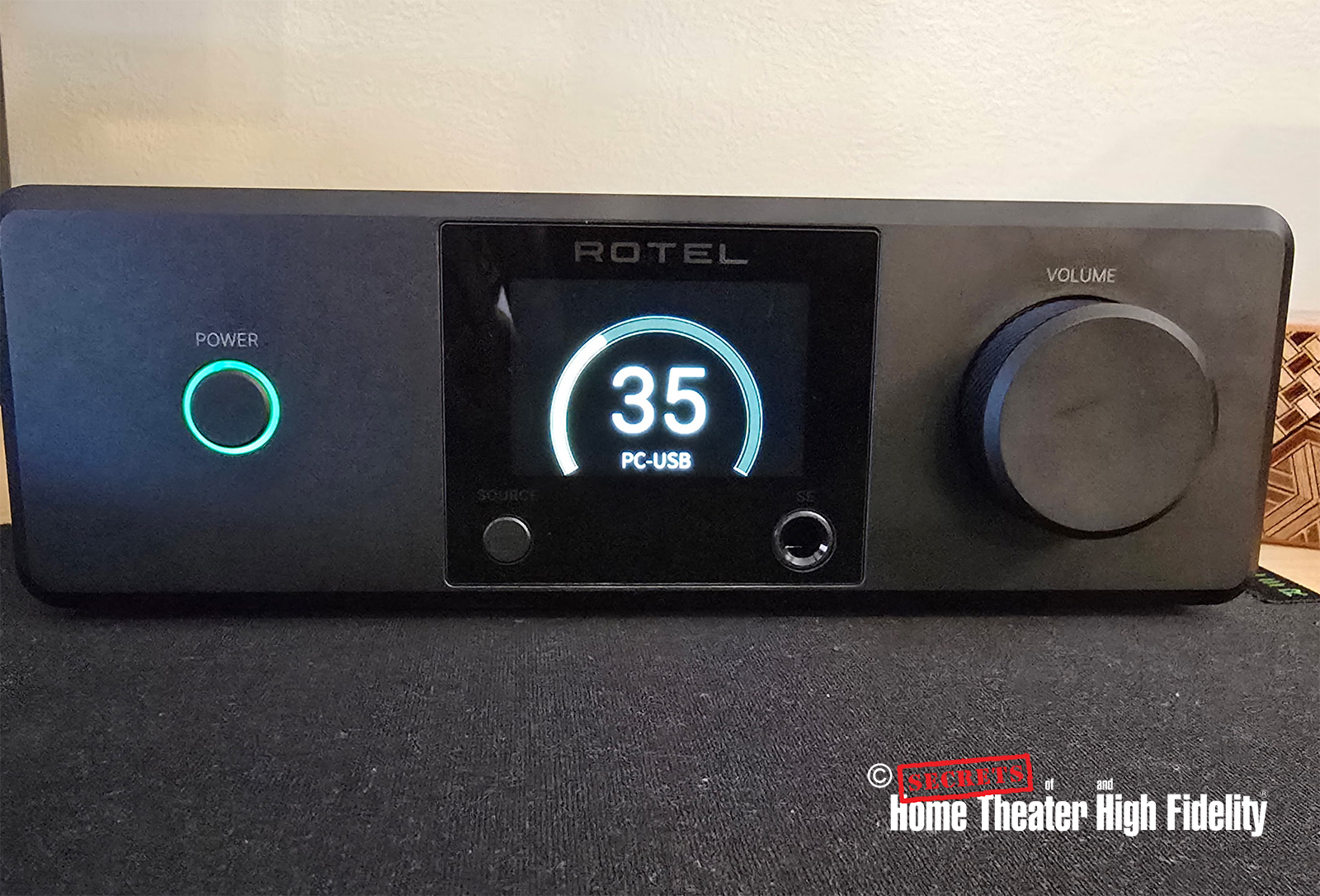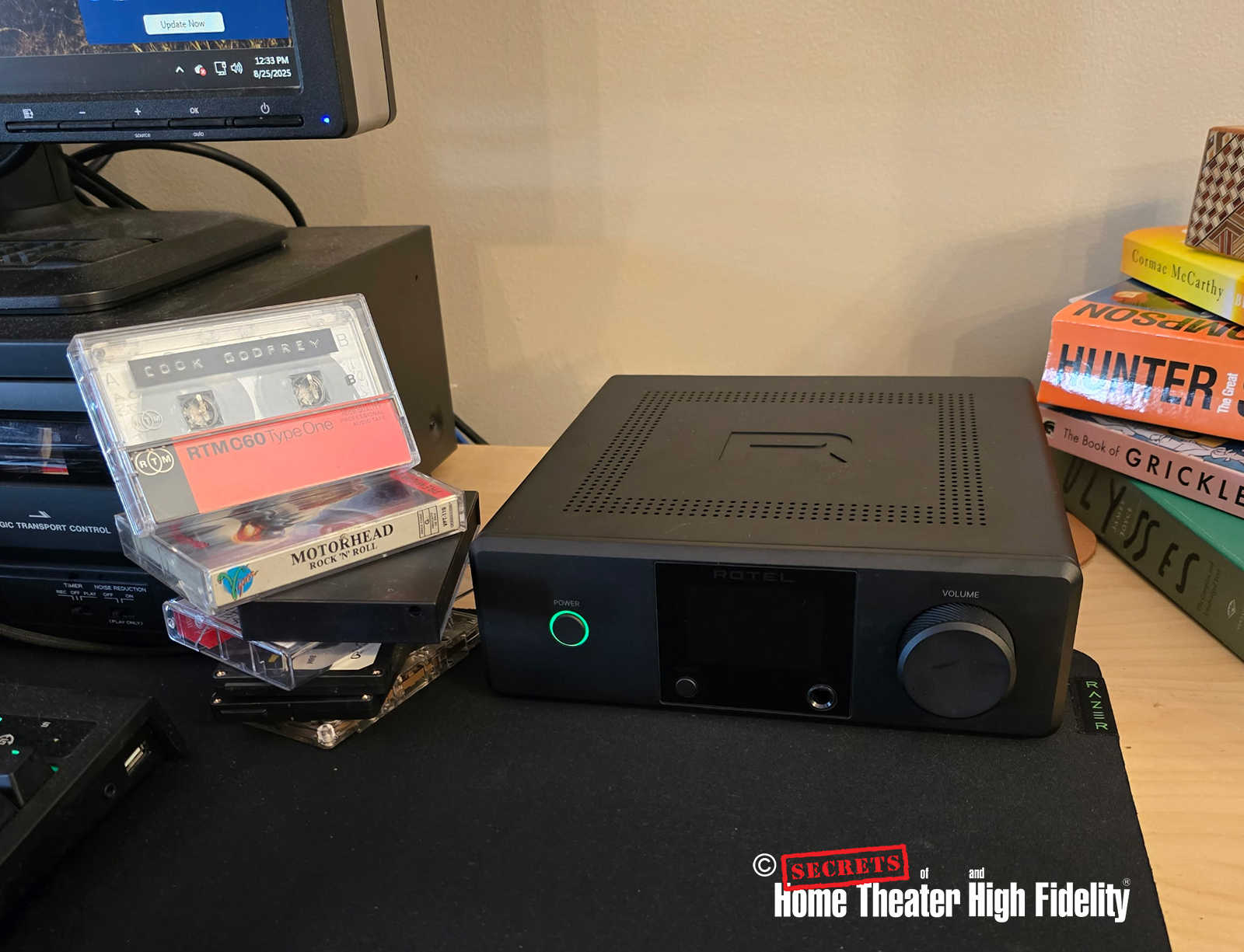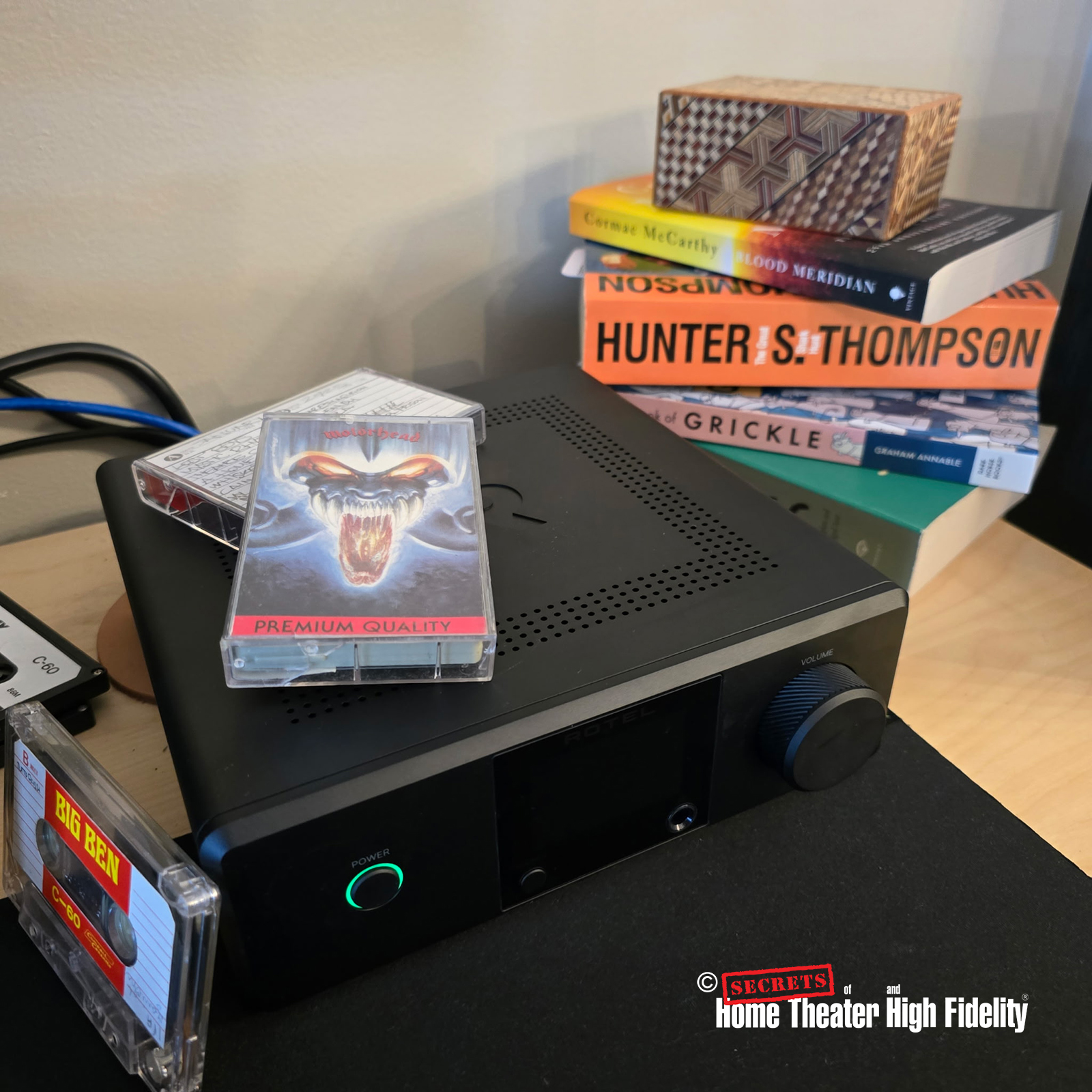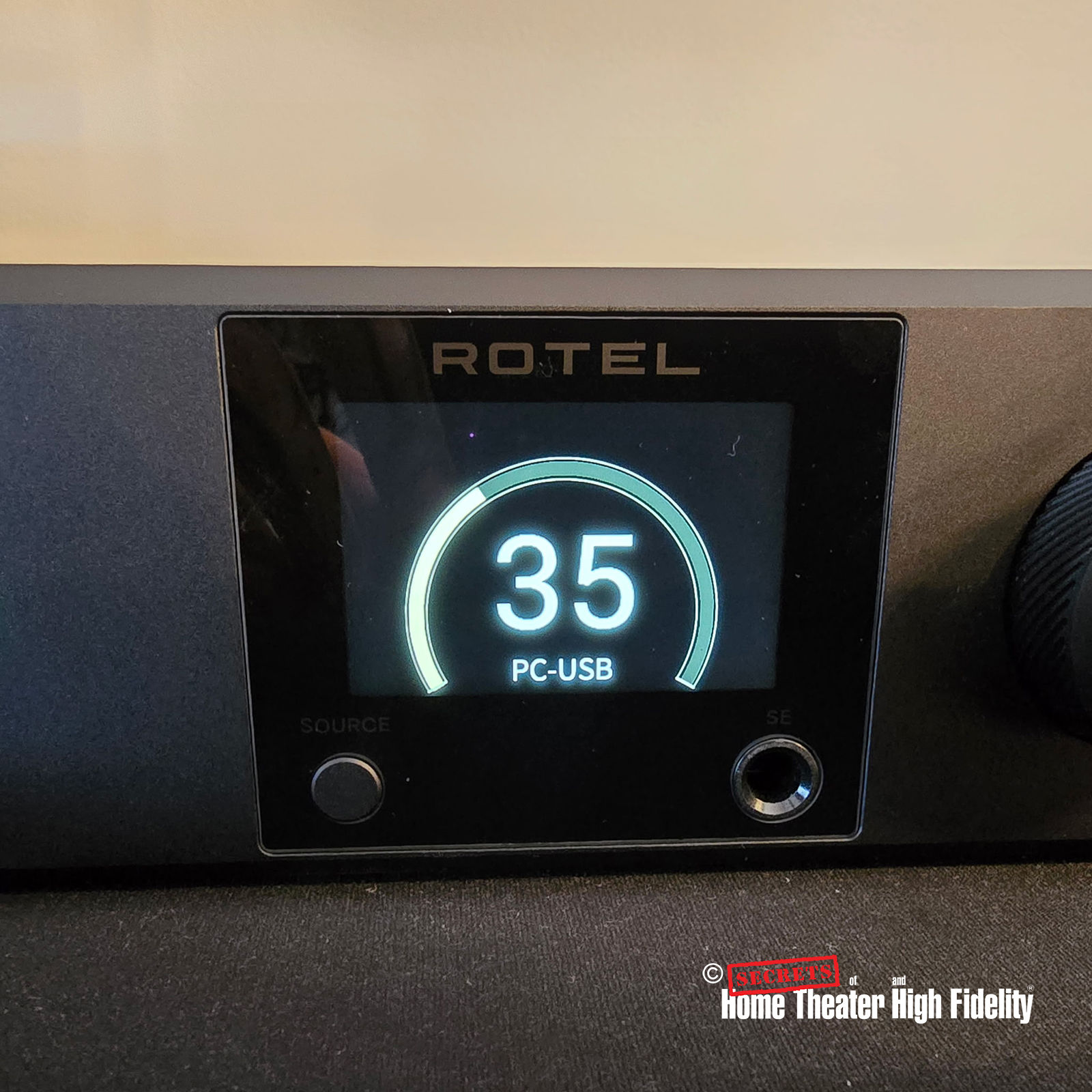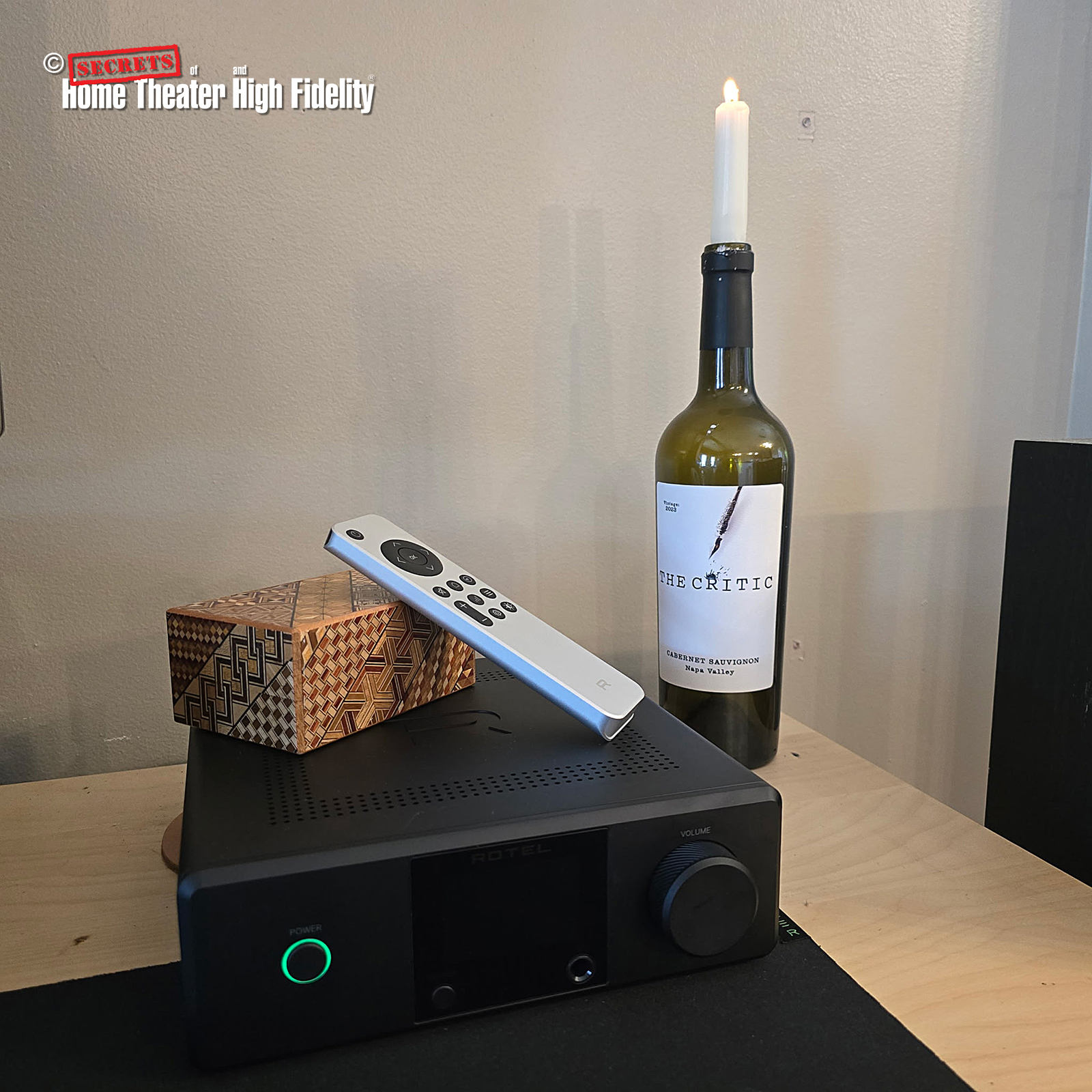Dark, deceptively heavy, and imposing; offering the intense sensation that this integrated amplifier is the product of some advanced higher being, or, at the very least… a very, very forward-thinking audio designer.
For any connoisseur of intricate sounds, any enthusiast of tactile pleasantries, for anyone who desires a more intimate experience, where one can almost hear the components whirring and interacting as the request of the user is processed behind a dark facade of quality aluminum. The Rotel DX-5 serves as a hefty, satisfying response to the perceived absence of palpable function in other, more trifling implements. Not to mention that it sounds impeccable, singing like a jet-black canary.
Rotel DX-5 Integrated Amplifier
- Sleek, fighter-jet design hides a formidable array of technical wizardry.
- Beautiful build quality.
- Superb sound befitting of such a finely-crafted object.
- High-quality display.
- DSD file playback capability via USB.
I have always experienced this Sweet Bliss when it comes to small details. The things that go “click, snap, whirr, shhhik…” objects that behave in a satisfying manner. Items that have a particular attention to minutiae when it comes to the intricacies of their function; when you can tell that the one who engineered this object had a resolute vision and wanted every movement, however mundane, to be rewarding to the end user. A piece of design so replete with simple yet elegant solutions that it was an absolute pleasure to use, even if it is only the middleman on the path to an end result – like (in my case) being the box that lets your computer talk with your speakers. I could immediately tell that the Rotel DX-5 would be a lesson in minimalistic, simple pleasures delivered with superb execution.
Design:
Compact Integrated Amplifier
Power Output (FTC):
25 wpc @ 8 Ohms
THD:
< 0.03%
Frequency Response:
10 Hz – 100kHz (0 ± 0.19 dB)
Damping Factor (20 Hz – 20k Hz, 8 Ω):
140
S/N Ratio (IHF “A” Weighted):
>100 dB
Input Sensitivity / Impedance:
680 mV / 100k Ω
Input Overload:
4.2 V
DAC Chipset:
ESS ES9039Q2M DAC
Digital Inputs:
1 x Coaxial, 1 x Optical, 1 x HDMI ARC, 1 x PC-USB, Bluetooth
Digital Sampling Rates:
Coaxial/Optical (24-bit/192kHz), PC-USB (32-bit/384kHz PCM, DSD 4x)
Analog Inputs:
1 pair RCA Analog
Outputs:
5-way speaker Binding Posts, 1 x Subwoofer RCA Output
Bluetooth Codec:
aptX HD, AAC
Dimensions (W × H × D):
215 x 76 x 251mm / 8 1/2 x 3 x 10″
Net Weight:
4.1 kg (9.1 lbs.)
Accessories:
Remote Control, USB Cable, Power Cord.
MSRP:
$1,699.00 USD
$2,249.00 CAD
Company:
SECRETS Tags:
rotel, integrated amplifier, desktop, dx-5, personal audio
Secrets Sponsor
Beginning with the aesthetics, the precision-milled metal body of the Rotel DX-5, jet black in its metallic complexion, uttered a satisfying trill as I extracted it from its luxury-grade foam housing. “Shrrrring!” phonated the sound of my finger running across the side of the unit, which sports lots of diagonal cut-outs to promote heat regulation – but I wasn’t concerned with the practical use of this side-vent. I ran my fingernail across it again. “Shhhrrrrring!” Ahh. Sweet Bliss.
Despite serving as the intermediary, the step between source and speaker – the Rotel makes itself known distinctly whilst still retaining an air of respect and total control… like a considerate host. The profile of the amp is small and unobtrusive – but get him started on a good story and the whole dining room is listening.
This command of attention is due in no small part to the gentleman host’s etiquette. All intention is respected, vindicated. The volume dial’s increments slot into place squarely as it turns, a level of feedback that allows you to register with certainty that your selection has been taken into account. The Power and Source buttons (the sole features on the face of the DX-5; excepting the dial, headphone jack, and small display) offer up a crisp noise that sounds like a thin twig snapping underfoot… in the best way. Reassuring and delightful. Encouraging footfalls are best served with crisp noises. That way, you know that you’re really walking in the woods, not, say, in some Hellish VR Nightmare.
All functions of the Rotel DX-5 speak to you, quietly. “Your Input Means Something.”
Soothing words.
After mashing and bashing the god-awful buttons that control the temperature on my oven, its horrible plastic face which demands incredible force from the fingers, practically punching the thing to finally time out an al dente for my pasta… it feels good to know that my input Means Something.
The level of hard-nosed pragmatism utilized during this design is matched only by the equal desire to make each doggedly pragmatic feature as delightful as possible.
Consider the effort that was put into the design of the remote. Cheap, plastic chassis with toy rubber buttons? No, no. Instead, solid milled-aluminum body that seems to sport a clever, clean sandblast finish; crisp, clicky keys which in turn boast a matte counterpoint to the finely textured metal; enough weight that it could be used as a tool for self-preservation during a robbery; and a battery slot which warrants a separate, entirely superfluous paragraph to convey the satisfactory action of that particular mechanism.
Ergo…
Included with the remote is a tool not unlike a SIM card pick, used by acne-ridden Verizon employees nationwide amongst their Kafkaesque workplaces. This small pick is inserted into a lone hole on the backside of the otherwise virginal, smooth remote and… “chik.” The rear is ejected ever so slightly, allowing one to drop the batteries into the body of the remote and replace the robust bottom piece with an equally satisfying “plic”. Simple sensations that elevate the experience tenfold.
When it comes to technical aspects, the analog pumping heart valve that keeps the Rotel ticking like a clock is the power supply – more specifically, it is the transformer itself, which is a substantial toroidal unit that is completely wound and manufactured in-house by Rotel. Nothing beats a product that is designed intentionally, from bones to tissue to skin… and when you deal with house-made parts like this transformer, parts that are usually outsourced to other manufacturers for convenience and cost-effectiveness… the extra time and effort make a difference.
If the power supply is the aortic valve of the unit, that makes the ESS ES9039Q2M DAC chipset the mitral valve. The beefy arsenal allows you to listen to high-resolution music through all the digital inputs (up to 24-bit 192 kHz via optical, coaxial, and HDMI, and up to 32-bit 384 kHz with DSD 4x via the PC-USB connection). It would be remiss of me to pretend like I know anything about the hierarchy of DAC chips and their quality… I possess about as much knowledge on the subject as some sort of Appalachian Moonshiner. However, I promise you, my father knows the difference, and I trust his discerning judgement. The man has assured me that these specs are nothing to scoff at.
“I been told these sum’ real highfalutin pieces of new-fangled hardware, hoo-wee!”
Having an HDMI ARC (with CEC) input means that you can route a modern TV’s stereo audio through the Rotel via that connection. Not only that, the two will be able to play nice, allowing the TV remote to adjust the DX-5’s volume and turn itself on and off with the TV. Consider all “movie night” functions covered. On top of that, the aptX-HD Bluetooth facilitates only the highest quality between my Android and the Rotel.
Given that I intended this to take up residence as my main computer audio setup, I was delighted to use the subwoofer output. I run a pair of ELAC bookshelf speakers and a matching ELAC subwoofer with my computer, usually paired with a D3045. The Rotel supplanted its duties for the purpose of this interview. As I discovered, the Rotel puts out a full-range signal, and during setup, I (my dad) needed to adjust the Low Pass settings on the subwoofer to achieve the best blend with my speakers. Incidentally, the DX-5 does not have any sort of bass management built into it.
Power-wise, the Rotel is rated to produce 25 watts per channel into 8 ohms and 33 watts per channel into 4 ohms, and the amplifier section is a Class AB design. I have been assured by the resident Audiophile Parental Unit that these are solid figures and that they perform well. The A.P.U. also informed me that while 25 watts may not sound like a huge number, it was more than enough to drive my speakers and compare favorably against my NAD’s 60 watts per channel rating.
I know what you’re probably thinking. “Why have you been talking about milled aluminum, chipsets, and batteries? How does the thing sound? Cut to the chase!”
This extensive description of crispness, cleanliness, and attention to clarity, which has been represented in the preceding exposition, is meant to serve as an allegory. Once I had wired the unit up and started to put sound through it, there was an immediate difference – a difference that is very difficult to describe in and of itself, but one that is wholly in line with the ethos that is represented within the engineering of the Rotel DX-5… these pleasant things which I attempt to illustrate.
Truthfully, here lies the bulwark that I always run into when trying to describe the performance of high-fidelity audio products. I find myself expending masses of words, imagery, metaphor, and simile in order to describe a particular feeling, a difference that can be summed up with the simplest and most underestimated form of literary devices…
“Shrrrring!”
This onomatopoeia is the most concise description I can give for the DX-5. At every juncture, every moment, not only does it succeed in responding with excellent sensory feedback, it… it sounds that way during performance. Panning is clearer and more distinct. Highs pierce, lows roar, et cetera… but any technical jargon I could deploy would serve to denigrate my characterization of what you, the readers, are actually looking for. From the way it feels on the fingers, to the heft and the density of it… all of these pleasantries are reflected in the listening experience. This aforementioned parallel encompasses the whole of its sound – a brightened and welcome difference from my previous amp, again evoking the ringing tone of that blackened aluminum facade against my fingernail. That precision of engineering, that Sweet Bliss hidden within is in every bit returned, with dividends. The deliberation, the level of intense focus that is written in bold letters all across the face of the Rotel DX-5 – the inner mechanisms attest to a different echelon of precision that is written with gold and silicon… the markedly robust power supply driving the entire contraption with intensity.
Despite being a carefully groomed and trained purebred, this Show Dog also plays nice with my TEAC W-1200 tape deck – breed difference aside. Not only that, the DX-5 seems to bring out details hidden deep in the mix… regardless of what it is singing – seeming to defy the limitations of magnetic tape (I can now hear Dr. Gonzo, screaming about his bad heart in the middle of the desert, punctuated with incredibly high, piercing fidelity… but it’s not like I leave these Easter Eggs on the tapes for anyone but myself). More to the point, on Rush’s “Mystic Rhythms,” I can hear the subtle pans on Neil Peart’s drums. Left to right, bouncing back and forth, evoking that Akira-esque appeal and at the same time confounding me… both because of the musical acumen of the group and also the ability of this diminutive black brick to bring out such dimension, such hidden form, even on a very antiquated medium; and one that had been subjected to recording on what could be considered a layman’s tool – my Dad’s Walkman Professional pales in comparison to the TEAC’s recording abilities… but here again I lose myself.
There is one circumstance in which the Rotel DX-5 displayed a level of persnickety-ness. I had, throughout the testing period, encountered some issues when it comes to the receptiveness of the sensor that engages the auto on/off mute… or some sort of mutation therein. It sometimes presented itself when I was time-scrubbing through YouTube videos, other times during video games after a moment on the pause menu – or even after a death-and-respawn – but sometimes the whole scheme just went mute. Inexplicably, fleetingly, all on hold… until a quick jolt back to reality got the whole machine running again.
I say “had” because the folks over at Rotel jumped on the issue with blinding speed, supplying me with a shiny new piece of firmware that squashed the bug. After mere moments with some technical instructions and a complementary cable, what seemed to be the solitary technical foible with the DX-5 disappeared into the rearview mirror, fleeing at the sight of exemplary customer service practices.
The Rotel DX-5 further distinguishes itself by virtue of its Bluetooth capability – adroit and brisk connections to the audio source circumvent frustrations often contingent on antiquated items (such as my suffering 2016 FIAT 500x, which regularly ignores my attempts at Bluetooth connection, causing me to smash the buttons and break them). It’s characterized by ease of connection and minimal headache. Clean, clear, blue, and toothy.
Not only that, the unit finds further distinguished aspects; it presents a level of accessibility that is inviting for the casual hobbyist – someone who is interested in quality sound but not so interested in calibrating and tuning every function such that it is perfected.
“take eet out tha box, plug eet een, let eet rock.”
This rather crude evaluation that is laced with appeals to the layman, however, is not meant to disenfranchise the sweeping selection of esoteric and detailed options offered by the DX-5 – the territory that is meant for experienced audiophiles alone. Those who count themselves among this group will be spoiled for choice, as the Rotel DX-5 also offers menu upon menu of intricate optimizations that will allow the aficionado to tailor his or her experience down to the finest detail.
Meanwhile, people like me watch people like my Dad futzing with the intricacies of everything, trying to balance this and that and the other… at some point, it all starts to lean into Greek symbols and graphs and strange charts that I will never understand. Such wizened elders can process, with great clarity, all the Holy Hidden Audio Truths and DSD files that they may desire. I was able to hear the sweet sounds of Steely Dan sung by a .dff file, such arcane symbols and technological encoding I had never heard the likes of before.
Point being, regardless of the large difference in attitude when it comes to installing new hardware, the Rotel DX-5 can acquiesce to whichever party it is subject to. Whether it be an anal-retentive audiophile like my father, or some young spit-stain punk like I am, the Rotel DX-5 drives it all. Not only the predilections and the preferences of the end user, but also the demeanor.
One could plug the thing in and forget about it, enjoying phenomenally improved phonics for the foreseeable future… or, one could dial it in intensely, spending hours hunched over the screen, finding just the right settings, listening and then listening back again.
Secrets Sponsor
The Rotel DX-5 is for those who care about sonics and composition simultaneously, whilst still maintaining a level of accessibility for both the Initiate and the Grand Master Audiophile.
- Appealing presentation and appearance
- Crisp, clean sound
- Accessible nature with additional advanced features
- Sturdy, robust construction
- Nothing of consequence.
The Rotel DX-5 is not unlike the iconic Monolith from 2001: A Space Odyssey. Whether you are a prehistoric monkey fighting off others from your watering hole or a highly-trained astronaut on some sort of detailed, psychedelic mission… this Monolith will be there. Full of Stars.


